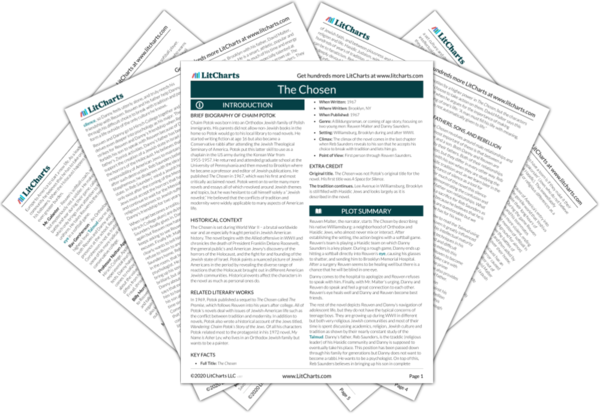The Chosen revolves around male relationships and the most important of these is that between a father and a son. Both Danny and Reuven are deeply influenced by their fathers. Both of their relationships are based on education, but they differ in every other way. Reb Saunders only speaks with his son when they are studying the Talmud because of Hasidic tradition and, as we learn later in the novel, a belief in the importance of silence as a tool for developing compassion. For much of the novel this silence seems irrational and cruel, demonstrating the confusion and mystery that can be a part of father-son relationships. What seems to be cruel treatment is a sacrifice for Reb Saunders as well. He chooses to act this way because he believes that he is saving his son’s soul. His methods are questionable but we come to learn the great love that he has for his son.
David Malter also teaches his son how to read the Talmud using close reading and careful thought. Reuven is greatly influenced by his father, and he eventually proves his intellectual maturity and prowess by using his fathers reading techniques in his college Talmudic course with his respected and difficult teacher, Rav Gershenson. David Malter also extends this teaching to other parts of life, encouraging Reuven to become friends with Danny, and to look closely at and take care with this friendship once he has it. David Malter is the prime example of a careful and thoughtful father and he also provides guidance to Danny when he cannot turn to his real father.
Rebellion is also an important aspect of the father son relationships in The Chosen. Danny directly rebels against his father by not becoming a tzaddic, and this choice of rebellion plagues him for the entire novel. His long path towards this decision is reflected in his growing interest in Freud. Although Freud’s concept of the Oedipal Complex (which includes rebellion of the son against the father) is never directly mentioned, his interest in and struggle with Freud points towards the importance of this fraught relationship with his father.
With all of this focus on fathers it is also necessary to mention the lack of mothers, and female figures in general, in The Chosen. Reuven’s mother died when he was very young and is only briefly discussed. Danny’s mother is alive, and presented as warm and loving, but she is also sick and frail. Danny’s sister is only briefly married and has an arranged marriage with a man who leaves a bad taste in Reuven’s mouth. Overall women are powerless and only ever seen on the fringes. Men are victims of a set culture and deep traditions, but they have their intellectual pursuits to occupy their minds and set them free if they truly want to. Women, on the other hand, are stuck. This marginalization of women is present in Hasidic societies, and Potok does critique it in some ways, but The Chosen is also largely uninterested in the role of women in this culture.
Fathers, Sons, and Rebellion ThemeTracker

Fathers, Sons, and Rebellion Quotes in The Chosen
“You think a friend is an easy thing to be? If you are truly his friend, you will discover otherwise.”
“Master of the Universe,” he almost chanted. “you gave me a brilliant son, and I have thanked you for him a million times. But you had to make him so brilliant?
“The world kills us,” he said quietly.” Ah, how the world kills us.” … “The world drinks our blood,” Reb Saunders said. “How the world makes us suffer. It is the will of God. We must accept the will of God.”
“I am not satisfied with it either, Reuven. We cannot wait for God. If there is an answer, we must make it ourselves.”
“What followers of a genius aren’t dogmatic, for heaven’s sake? The Freudians have plenty to be dogmatic about. Freud was a genius.”
Poor Danny, I thought. Professor Appleman, with his experimental psychology, is torturing your mind. And your father, with his bizarre silence – which I still couldn’t understand, no matter how often I thought about it – is torturing your soul.”
The death of six million Jews had finally been given meaning, he kept saying over and over again. It had happened. After two thousand years, it had finally happened. We were a people again, with our own land. We were a blessed generation. We had been give the opportunity to see the creation of the Jewish state.
“… words are cruel, words play tricks, they distort what is in the heart, they conceal the heart, the heart speaks through silence. One learns of the pain of others by suffering one’s own pain, he would say, by turning inside oneself, by finding one’s soul.”











